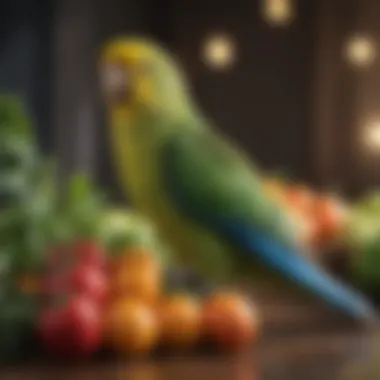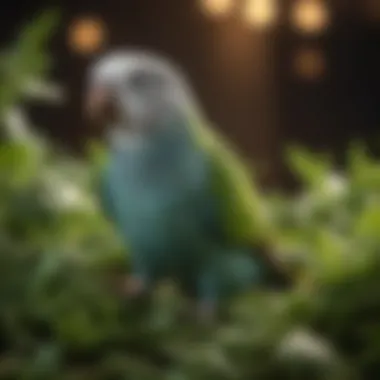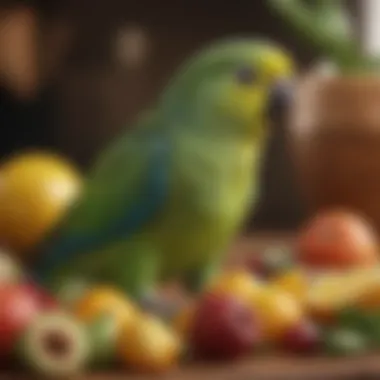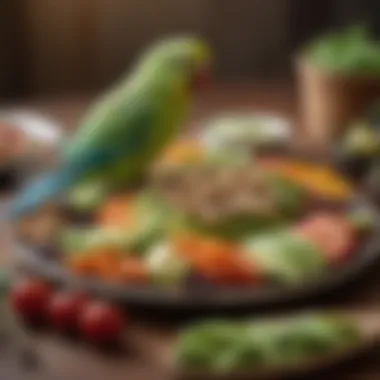Nourishing Parakeets: The Power of Fresh Food


Intro
Feeding parakeets is not just about providing seeds or pellets. It's much more than that. Parakeets benefit significantly from fresh foods. These foods add variety, nutrients, and essential vitamins to their diets. Understanding the foods that are suitable and how they affect your parakeet's health is crucial.
This article aims to explore the nutritional benefits of fresh food for these vibrant birds. It discusses their specific dietary needs and the types of fresh foods that can improve their health. Additionally, it looks into how to prepare and serve these foods effectively.
Understanding Your Pet
Pet Behavior Basics
To care well for a parakeet, it's helpful to understand how they behave. Parakeets are social creatures. They thrive on interaction, both with humans and other birds. Observing their behavior can provide insights into their health and well-being. For instance, a parakeet that is active and chirps frequently is likely content. On the other hand, a quiet and inactive bird might need attention or a dietary adjustment.
Common Breed Characteristics
There are several breeds of parakeets, like the Budgerigar, Cockatiel, and Indian Ringneck. Each breed may have unique characteristics but generally, they all share some common needs. These include a balanced diet, space to exercise, and mental stimulation. Knowing the specific requirements of your breed helps in tailoring their diet.
Species-Specific Needs
Parakeets need a diet rich in vitamins, minerals, and fiber. Fresh food plays a significant role in meeting these needs. This includes vegetables like spinach or carrots and fruits like apples or berries. The right combination enhances their health significantly. Feeding only seeds can lead to nutritional deficiencies.
Fresh Food Options
When selecting fresh food for your parakeet, consider options that are safe and nutritious.
- Leafy Greens: Kale, spinach, and romaine lettuce provide essential vitamins.
- Fruits: Apples, blueberries, and bananas offer natural sugars and fiber.
- Vegetables: Carrots and peas are also great options.
Make sure to wash all fruits and vegetables thoroughly to remove pesticides.
Feeding Guidelines
Feeding fresh food should complement the regular diet of seeds and pellets. A good rule of thumb is to fill about one-quarter of your parakeet's food dish with fresh offerings. Introduce new foods gradually, as some birds may be cautious about unfamiliar items.
Fresh food is not only a treat but also crucial for your parakeet's health and longevity.
Practical Preparation Tips
Before serving fresh food, proper preparation is key. Cut fruits and vegetables into small, manageable pieces. This prevents choking and makes it easier for the bird to eat. It’s also important to remove any uneaten food after a few hours to maintain hygiene and avoid spoilage.
End
Incorporating fresh foods into your parakeet's diet can make a significant difference in their overall health. Understanding their needs, choosing the right options, and following proper feeding guidelines ensures your pet lives a vibrant and healthy life. With the right knowledge and a little attention, you can create a balanced diet that benefits your feathered friend.
Understanding Parakeet Nutrition
Understanding the nutritional needs of parakeets is crucial for maintaining their health and well-being. Parakeets are small, active birds, and their diet directly influences their behavior, physical condition, and lifespan. Ensuring they receive the right balance of nutrients promotes not only vitality but also a vibrant plumage and optimal digestion. Many pet owners may not fully grasp which foods are appropriate or what specific nutrients are necessary. This section aims to clarify the essential elements of parakeet nutrition and the integral role fresh foods have in their diet.
Essential Nutrients for Parakeets


Parakeets require a range of essential nutrients to thrive. These include proteins, carbohydrates, fats, vitamins, and minerals. Each nutrient plays a specific role in the health and development of these birds:
- Proteins: Vital for growth, muscle development, and overall body function. High-quality protein sources can be found in seeds, legumes, and certain vegetables.
- Carbohydrates: These provide energy, especially for such active creatures. Grains and seeds are great sources but should be balanced to avoid excessive fat.
- Fats: Necessary for a healthy feather condition and energy storage. Though fats should be included, excessive amounts can lead to obesity.
- Vitamins: A mix of vitamins, including A, D, E, and B-complex, is essential. Fresh fruits and vegetables contribute significantly to meeting these needs.
- Minerals: Calcium, phosphorus, and other trace minerals are required for healthy bones and egg-laying in females. Green leafy vegetables can enhance their mineral intake.
Understanding these elements lays a foundation for making informed dietary choices that benefit parakeets significantly.
Role of Fresh Foods in Their Diet
Fresh food is an indispensable part of a parakeet's diet. Wit its variety, fresh produce not only satisfies the birds' nutritional needs but also provides mental stimulation. Fresh fruits and vegetables are filled with essential vitamins that are not as prevalent in dry seed diets. Offering fresh items encourages foraging behavior, which is vital for psychological health. Moreover, the high water content in fruits and vegetables helps maintain hydration, particularly in warmer climates.
When integrating fresh foods, it is important to recognize that variety is critical. Rotating different fruits and vegetables helps ensure a wide spectrum of nutrients, preventing dietary deficiencies while keeping parakeets interested in their meals. To summarize, fresh foods serve both as a nutritional powerhouse and as a source of enrichment that nurtures both physical and mental health in parakeets.
Fresh food offers a spectrum of nutrients essential for parakeets, preventing deficiencies and promoting natural behaviors.
Benefits of Fresh Food for Parakeets
Incorporating fresh food into a parakeet's diet is essential for various reasons that affect their overall health and well-being. Fresh food offers a spectrum of nutritional benefits that are pivotal for facilitating proper growth and maintenance of unique body functions. By understanding these advantages, pet owners can make informed choices that positively influence their feathered companions.
Enhancing Digestive Health
Fresh food includes high levels of fiber, which is crucial for a parakeet's digestive system. A diet rich in fruits and vegetables can prevent common digestive issues. The fibers found predominantly in fresh produce support the movement of food through the gut, promoting healthy bowel movements. Essential vitamins and minerals present in these foods also contribute to a balanced microbiome within the gut. Here are some notable reasons why fresh foods enhance digestive health for parakeets:
- Improved Digestion: Fresh food such as leafy greens and certain fruits supports digestive enzymes, aiding nutrient absorption.
- Prevention of Constipation: High fiber content helps to combat constipation, which can be a common issue among parakeets.
- Gut Health: Fresh food encourages a thriving community of beneficial gut bacteria that play a vital role in breaking down food and absorbing nutrients.
Improving Feather Condition
A parakeet's feather condition is a direct reflection of its overall health. Fresh foods provide essential nutrients that promote vibrant feathers and a healthy skin. Specific vitamins, such as Vitamin A, found in various fresh fruits and vegetables, help in feather growth and maintenance. Parakeets receiving adequate fresh produce often exhibit:
- Shinier Feathers: A rich intake of nutrients leads to naturally shiny and beautiful plumage.
- Reduced Molting Issues: A well-nourished parakeet will experience less stress during molting seasons, making the process smoother.
- Healthy Skin: Hydration from fresh produce aids in maintaining skin elasticity and reducing irritation or dryness.
Boosting Immune Function
Feeding parakeets with fresh food can significantly enhance their immune systems. Many fresh fruits and vegetables contain antioxidants and phytochemicals that help combat free radical damage. By incorporating fresh produce, parakeets can benefit from a stronger immune response to diseases. Significant benefits include:
- Disease Resistance: A healthy diet helps parakeets fend off common infections and illnesses.
- Enhanced Recovery: In the event a parakeet does become ill, a diet high in fresh food contributes to quicker recovery times.
- Long-term Wellness: Regular consumption of fresh foods leads to long-term benefits in overall health and resilience against environmental stressors.
Important Note: Always research and ensure the specifics of your parakeet's dietary needs. Tailoring the diet to their requirements is crucial for maximizing these benefits.
In summary, the nutritional benefits of fresh food for parakeets range from improved digestive health to enhanced feather condition and stronger immune function. By integrating a variety of fresh produce into their diets, pet owners can promote the well-being of their parakeets and help them thrive.
Types of Fresh Food Suitable for Parakeets
Incorporating fresh food into a parakeet's diet is essential for their overall health. Fresh foods provide key vitamins and minerals that aid in various bodily functions. These foods complement commercial pellets and seeds, bringing a diverse set of nutrients. Understanding the types of fresh food suitable for parakeets helps pet owners create a balanced diet, promoting better health and longevity.
Fruits: A Natural Treat
Common Fruits to Include
Fruits are vibrant and appealing additions to a parakeet's diet. Common fruits such as apples, bananas, and berries are excellent choices. These fruits are high in vitamins, particularly Vitamin C, which can boost immunity and energy levels in parakeets. The sweetness of fruits often attracts parakeets, encouraging them to try these healthy items. When offering fruits, ensure they are fresh and free of pesticides. One unique feature of these fruits is their water content. This can help keep the parakeet hydrated, especially in warmer months.


Fruits to Avoid
Not all fruits are safe for parakeets. Some fruits, like avocados and certain citrus items, should be avoided. Avocado contains a compound called persin, which is toxic to birds. Citrus fruits may cause digestive issues in parakeets. Knowing which fruits to avoid is crucial to keeping your pet safe. The unique characteristic of these fruits is their potential to harm rather than benefit. Parakeet owners should always research unfamiliar fruits before including them in diets.
Vegetables: A Nutritional Powerhouse
Recommended Vegetables for Parakeets
Vegetables such as carrots, broccoli, and spinach provide essential nutrients for parakeets. These foods are rich in fiber, vitamins A, C, and K, which assist in various bodily functions. The vibrant colors of vegetables can stimulate a parakeet's interest in trying new foods. A unique aspect of these vegetables is their versatility. Parakeets can enjoy them raw, steamed, or shredded for easier eating. Regular inclusion of these vegetables leads to improved overall health in birds.
Vegetables to Limit
While many vegetables are suitable, some should be limited in a parakeet's diet. Vegetables like corn and peas contain higher starch levels. Too much starch can lead to obesity and health issues over time. Recognizing the balance between nutritious and starchy vegetables is key. The unique feature of these limited vegetables is that they can still be flavorful but should not dominate the diet.
Greenery: Fresh Herbs and Greens
Herbs that Benefit Parakeets
Fresh herbs like parsley, cilantro, and basil can add more flavor and nutrition to a parakeet's diet. These herbs are known for their aromatic properties and can stimulate a parakeet's senses. They are also rich in vitamins and antioxidants. A noteworthy aspect of these herbs is their ability to provide variety in flavor, which may encourage picky eaters. Adding herbs is an easy way to enhance meals and support health.
How to Serve Fresh Greens
Serving fresh greens to parakeets can be done in various ways. Greens like kale and swiss chard can be offered whole or chopped. This flexibility allows for convenience and encourages birds to explore textures and flavors. Fresh greens should be free of any chemicals and rinsed well before serving. One advantage of incorporating fresh greens is that they can help maintain hydration due to their water content. Ensuring that greans are appealingly presented can encourage parakeets to try new foods, enhancing their diet further.
Best Practices for Feeding Fresh Food
Providing fresh food for parakeets can be very beneficial. However, to gain the most from these fresh options, it is essential to follow certain best practices. This part of the article emphasizes important steps to prepare, serve, and monitor fresh food.
Preparing Fresh Food Safely
Washing and Cutting Techniques
Ensuring food hygiene is critical for parakeets. Washing fresh produce removes pesticides and contaminants. Rinsing fruits and vegetables under cool running water is recommended. Cutting the food into appropriate sizes aids in easier consumption. Smaller pieces are often better because parakeets have small beaks.
The key characteristic of these techniques lies in their safety and simplicity. Fresh food not properly washed may pose health risks for parakeets. Cutting with clean tools minimizes the chances of cross-contamination.
In this article, the unique feature of washing is its role in maintaining bird health. If produce is not cleaned well, it could lead to digestive issues. Therefore, always wash thoroughly and cut food before offering it to your parakeet.
Storage Tips for Fresh Produce
Fresh produce must be stored correctly to keep it safe for parakeets. Storing food in the refrigerator can prolong shelf life. Using airtight containers can help avoid spoilage. Fruits and vegetables should be stored separately to maintain freshness.
A key point here is that fresh produce loses its nutritional value over time. Thus, timely feeding is important. If you notice any signs of decay, do not feed that to your bird.
The unique feature of storage practices is their role in ensuring optimum freshness. Good storage prevents food from becoming staleness and unappetizing. Fresh food significantly contributes to a parakeet's health when handled properly.
Establishing a Feeding Routine


Consistency in feeding is vital for parakeets. Creating a structured feeding schedule helps regulate their diet. Regular feeding times can promote a sense of security for the bird. Additionally, it can also stimulate their appetite. Start by setting specific times each day when fresh food will be offered.
Some parakeet owners choose to rotate fresh foods, keeping variety in their diet. This ensures that birds get a range of nutrients. A routine feeding schedule can also help you monitor what they eat. Take note of what your bird enjoys most.
Monitoring Intake and Preferences
Observing which fresh foods your parakeet prefers is crucial. Monitoring feeding habits can help you adjust their diet as needed. If certain foods are left untouched, it might be wise to reconsider including them.
You can take notes on daily intake. This practice helps track changes in appetite as well. Parakeets can be picky eaters. By acknowledging their preferences, you can ensure a more balanced diet.
Lastly, be alert for any changes in energy levels or behavior that may indicate dissatisfaction or health issues.
“Fresh food significantly contributes to a parakeet's health when handled properly.”
Potential Risks of Fresh Food
Incorporating fresh food into a parakeet's diet provides numerous benefits, but it also carries certain risks. Understanding these risks is crucial for pet owners aiming to maintain the health and longevity of their feathered companions. Being informed about which foods to avoid and how to balance a diet can help prevent potential health issues. This section will specifically address two main considerations: avoiding toxic foods and balancing fresh and commercial diets.
Avoiding Toxic Foods
Parakeets are sensitive creatures, and some common foods may be harmful to them. It is vital for pet owners to familiarize themselves with these toxic foods to ensure the safety of their birds. Some of the most dangerous foods include:
- Avocado: Contains a substance known as persin, which can cause respiratory distress and even death in birds.
- Chocolate: This sweet treat is toxic to many animals, including parakeets, causing heart and nervous system problems.
- Caffeine: Found in coffee and tea, caffeine can lead to increased heart rates and even seizures.
- Onions and Garlic: These can damage a bird’s red blood cells, leading to anemia over time.
- Tomato Leaves and Stems: While the fruit itself is safe in moderation, the green parts are harmful.
Additionally, certain seeds and pits from fruits like apples or cherries contain cyanogenic compounds that release cyanide when metabolized. Always ensure that fruits and vegetables given to parakeets are safe and free from any toxic components.
“Knowledge about toxic foods is the first step towards a safe and healthy diet for parakeets.”
Balancing Fresh and Commercial Diets
A well-rounded diet for parakeets should comprise both fresh foods and high-quality commercial bird diets. While fresh foods provide essential vitamins and minerals, commercial diets are formulated to meet the specific nutritional needs of parakeets. Here are some key points to consider:
- Consistent Base Nutrients: Commercial diets, such as pellets or seed mixtures, are designed to deliver balanced nutrition. They often contain necessary vitamins and minerals that may not be present in fresh food alone.
- Fresh Foods as Supplements: Fresh fruits and vegetables should be seen as supplements to the main diet rather than replacements. They provide variety and enhance taste, which can help with overall food acceptance.
- Portion Control: It’s important to monitor the amount of fresh food offered. Too much fresh food can upset the balance of nutrients, leading to health issues like obesity or malnutrition.
- Diet Transition: If introducing fresh food to a parakeet's diet, it should be done gradually. This helps prevent digestive issues and allows the bird to adapt to new tastes and textures.
Balancing these two dietary elements can boost the health and vitality of parakeets, ensuring their diets are both enjoyable and nourishing. An informed approach will assist pet owners in making the best dietary choices for their feathered friends.
The End: Making Informed Dietary Choices
In the journey of ensuring optimal health for parakeets, making informed dietary choices is crucial. Parakeets, like all living beings, require a diet that supports their unique needs. As discussed in this article, incorporating fresh food into their daily meals can lead to significant health benefits. However, understanding the balance and variety in their diet is equally important. This balanced approach not only meets their nutritional requirements but also enhances their overall well-being.
The Importance of Variety and Balance
A diet that includes a variety of fresh foods ensures that parakeets receive essential nutrients. Different types of fruits, vegetables, and greens offer diverse vitamins and minerals that are vital for their growth and health. For instance, fruits like apples provide vitamin C, while leafy greens offer iron and fiber. Therefore, it is essential for pet owners to rotate the selection of foods regularly to avoid nutritional deficiencies and support vibrant health.
Moreover, balance is key. While fresh foods are beneficial, they should not completely replace high-quality pellets and seeds that offer complete nutrition. The right mix helps maintain a healthy weight and prevent dietary-related diseases. Providing a balance of commercial diets alongside fresh produce is beneficial. This mix fosters long-term health while keeping parakeets engaged with their food, which promotes natural foraging behaviors.
Long-Term Benefits of Fresh Food
The long-term advantages of incorporating fresh foods into a parakeet's diet are substantial. Fresh produce is packed with antioxidants and has hydrating properties, which are essential for preventing common health issues such as obesity and feather plucking. Additionally, these foods can enhance a bird's immune system, helping them to fight off diseases more effectively.
A fresh food approach leads to better feather condition and healthier skin. Parakeets that consume a variety of fresh foods often exhibit brighter plumage and improved vitality. Regular consumption of these nutrient-dense options establishes foundational health, contributing to longevity.
It's also important to monitor how a parakeet responds to new foods introduced into their diet. Observing changes in behavior, activity levels, and overall condition can give insights into how well they are adapting to their meals. A proactive approach to diet will enhance not only physical health but also the emotional well-being of parakeets.
Making informed, knowledgeable choices about fresh food can transform the life of a parakeet, ensuring they thrive in their home environment.







